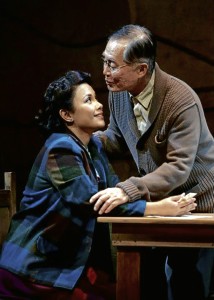SAN DIEGO, CA—George Takei, our fearless “Allegiance” lead actor, has made it his legacy project to take our musical to Broadway. In interviews, he has been quoted as “very determined” to make that happen. I don’t doubt his persistence one bit—after all, he was the inspiration for the creation of the show.
A few years ago, George and his husband Brad Altman met two of our creative partners in “Allegiance,” Jay Kuo (book, music, and lyrics) and Lorenzo Thione (book) at a Broadway show.
George and Brad went to see “In the Heights,” a few seats away from Jay and Lorenzo. At the end of Act I, the father figure sang a song called “Inutil” which sent George bawling like a baby.
Jay and Lorenzo later approached George and asked what was wrong; George then recounted that the song reminded him so much of his father and what he felt during the Japanese-American internment (George and his family were sent to Rohwer Camp in Arkansas, then later to Tule Lake).
After more conversations over drinks and dinners, Jay and Lorenzo thought of writing “Allegiance,” inspired by George’s stories.
George’s stories
Now, three years after its very first public reading, we are on stage performing the musical to packed houses at the Old Globe Theater here. (By the way, we have been extended an extra week until Oct. 28.)
“Allegiance” is a story of how the United States government failed its own citizens, by placing them in internment camps up and down the West Coast on the sole basis of their looking like the enemy, the Japanese, across the Pacific Ocean.
Millions of dollars in property were lost and about 120,000 American citizens and residents were put behind barbed wire fences, rounded up like criminals and placed in horse stables before being shipped off to hastily constructed camps—all of these taking place without due process.
No charges were filed, no trials were held. The government classified them as “Enemy Non-Aliens,” and the military branded them as “Enemy Aliens,” barring any young Japanese-American man from signing up to fight for the US.
Later on, many of these young men were nonetheless urged to volunteer for the 442nd regimental combat unit (a lot were also drafted from behind those barbed wire fences). It became the most decorated unit that served in World War II.
However, there were others who questioned the government’s decision to draft them, and wanted their families to be sent home first before joining the fray. These men, called “No-No Boys,” were charged with draft evasion and sent to federal prison.
At the end of the war, the internees were sent home, given $25 and a bus ticket. Many families had no homes or livelihoods to return to. George and his family lived on skid row for a few years before they were able to get back on their feet again.
All of us in the cast and crew of “Allegiance” now join George in telling the story of this very dark period in American history, so more people will know that such a grave injustice can (and has) happened in this great democracy, and in other democracies all over the world, including the Philippines.
For the past 26 years after the Edsa People Power revolt, Filipinos have been enjoying the fruits of democracy, including freedom of expression. This basic right isn’t lost on me as a new member of the entertainment press. I feel blessed to be granted the great responsibility of being able to let my little voice be heard on a weekly basis to tell stories about the world of musical theater as well as observations about life in general.
I would not take it kindly if my voice is in any way silenced and taken away. I want, and need, to be heard.
